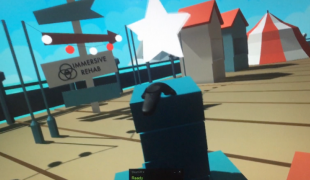- 7310
- 543
- 14
- 12
- 0
- Help Ukraine
About the solution
Frenalytics is a patented online software that works as a medical portal, therapy tool and analytics tracker specifically designed to help people with neurological deficits on their road to recovery. Thanks to data analysis, it provides the user with a personalised treatment. It can be used by families and/or facilities. The software also stores patients’ medical records and features online therapy sessions.
“I always thought I wanted to be a doctor. I was really serious about helping others, and then I discovered that my real passion lies in computers. I found myself in the health care technology space, not being a doctor, but being able to create software that helps people in a very similar way”, the developer observed.
Matt was driven to think of a solution of this kind after his grandmother suffered a stroke when he was in the 7th grade. The stroke left Matt’s grandmother paralysed, unable to speak and with cognitive limitations. At the time, a made a PowerPoint quiz to try to help her relearn things and exercise her memory. Part of this quiz had a family photo and asked the grandmother, one by one, “who is this person?”. Another part had photos of the kitchen, which helped her remind about eating and cooking. This proved to be very helpful in this lady’s recovery.
Frenalytics can help not only patients recovering from a stroke or a brain-impairing accident, but also people suffering from Alzheimer’s or dementia, or even experiencing post-traumatic stress.
“Her improvement was noticeable as she was able to communicate better with people. We saw a gradual return of parts of her personality, and I would say her quality of life definitely had improved overall”, said Giovanniello’s father, Tony, who is a medical doctor.
Matt’s goal was to create a software to help his grandmother only. But Chris Patterson, a family friend, who is now Matt’s business partner, saw its potential. And the two founded a company together around this solution.
Adapted from: https://bit.ly/2GiGKcY
More info: http://www.frenalytics.com/
https://www.youtube.com/watch?v=Gvq_FeQxjfs
This solution shall not include mention to the use of drugs, chemicals or biologicals (including food); invasive devices; offensive, commercial or inherently dangerous content. This solution was not medically validated. Proceed with caution! If you have any doubts, please consult with a health professional.
DISCLAIMER: This story was written by someone who is not the author of the solution, therefore please be advised that, although it was written with the utmost respect for the innovation and the innovator, there can be some incorrect statements. If you find any errors please contact the patient Innovation team via info@patient-innovation.com
-
-
547
-
0
-
6964

Bailey ID Solutions
COMMUNICATION: Communicating, whether by speaking, listening, or other means
CAREGIVING
Epilepsy
Brain Injury (Abscess, Brain Barrier Defect, Brain Contusion, Brain Hemorrhage, Brain Edema)
Website
Treatment/Surgical device
Seizures
To improve Treatment/Therapy
Caregiving Support
General and Family Medicine
Neurology
Psychiatry
United States
-
-
-
461
-
0
-
4940

Helping people affected by neurological conditions live more independent lives again with our digital therapies for neurorehabilitation.
CAREGIVING
(SELF)-CARE: EATING: Eating independently.
(SELF)-CARE: DRINKING: Drinking independently.
(SELF)-CARE: HYGIENE: Maintaining personal hygiene
BODY BALANCE: Maintaining body balance
Multiple Sclerosis
Spinal Cord and Nerve Root Disorders
Stroke
Assistive Technology access
3d Printed
Treatment/Surgical device
Website
Muscle cramps or spasms
Difficulty coordinating movements
Stiffness or rigidity (difficulty moving)
Muscle weakness
Anxiety
Fatigue
Cold hands or feet
Restoring mobility
Rehabilitating After Stroke
Managing Neurological Disorders
Recovering from Traumatic Injuries
To improve Treatment/Therapy
Cardiology
General and Family Medicine
Intensive Care Medicine
Neurology
Physical Medicine and Rehabilitation
United Kingdom
-
-
-
544
-
0
-
8817

Student invents "epilepsy alarm" for his grandmother
CAREGIVING
COMMUNICATION: Communicating, whether by speaking, listening, or other means
Epilepsy
App (Including when connected with wearable)
Muscle cramps or spasms
Stiffness or rigidity (difficulty moving)
Loss of balance
Sleep disturbances
Anxiety
Twitching or involuntary movements (myoclonus)
Seizures
Managing Neurological Disorders
Enhancing Mental Health
To improve Treatment/Therapy
Preventing (Vaccination, Protection, Falls, Research/Mapping)
Caregiving Support
General and Family Medicine
Neurology
Psychiatry
Public Health
China
-
 en
en